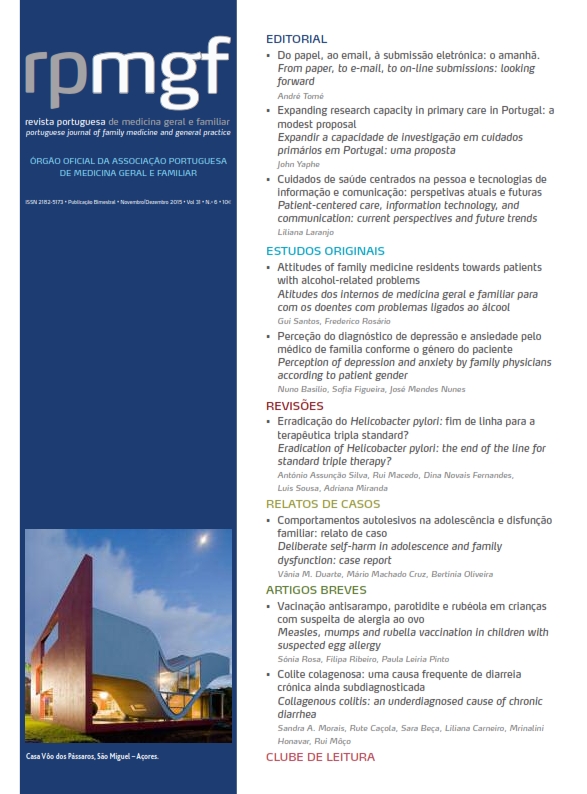Family Medicine residents’ attitudes towards patients with Alcohol-Related Problems
DOI:
https://doi.org/10.32385/rpmgf.v31i6.11490Resumo
Objectives: to evaluate family medicine residents’ attitudes towards patients with alcohol-related problems.
Study design: cross-sectional study.
Participants: family medicine residents registered at the Lisbon’s Family Medicine Residency Coordination.
Methods: attitudes towards alcohol-related problems were assessed using the Short Alcohol and Alcohol Problems Perception Questionnaire. Associations were tested between questionnaire scores, gender and postgraduate training year.
Results: one hundred and ninety five residents meeting inclusion and exclusion criteria answered the questionnaire. The mean residents’ age was 29.2 years, and 74.4% were female. Residents felt role secure in working with drinkers (88.7% scored above Role Security scale midpoint) but reported lower levels of Therapeutic Commitment (57.9% scored above scale’s midpoint). Although residents showed on average positive attitudes, they considered working with drinkers an unpleasant task, since only 22.6% scored above Satisfaction’s subscale midpoint. Male and female residents reported similar attitudes towards drinkers in all questionnaire’s domains (all P>0.05), and their attitudes remain unchanged throughout training (all P>0.05).
Conclusions: residents’ attitudes towards patients with excessive alcohol consumption remain unchanged as they go through residency training. Inclusion of alcohol specific training modules into the residency programme that take residents’ attitudes into account may help to improve residents’ willingness to engage with patients with alcohol-related problems.
Downloads
Publicado
Edição
Secção
Licença
Os autores concedem à RPMGF o direito exclusivo de publicar e distribuir em suporte físico, electrónico, por meio de radiodifusão ou em outros suportes que venham a existir o conteúdo do manuscrito identificado nesta declaração. Concedem ainda à RPMGF o direito a utilizar e explorar o presente manuscrito, nomeadamente para ceder, vender ou licenciar o seu conteúdo. Esta autorização é permanente e vigora a partir do momento em que o manuscrito é submetido, tem a duração máxima permitida pela legislação portuguesa ou internacional aplicável e é de âmbito mundial. Os autores declaram ainda que esta cedência é feita a título gratuito. Caso a RPMGF comunique aos autores que decidiu não publicar o seu manuscrito, a cedência exclusiva de direitos cessa de imediato.
Os autores autorizam a RPMGF (ou uma entidade por esta designada) a actuar em seu nome quando esta considerar que existe violação dos direitos de autor.





